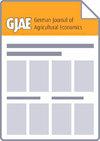The Potential of Different Experimental Designs for Policy Impact Assessment
IF 1.5
4区 经济学
Q4 AGRICULTURAL ECONOMICS & POLICY
引用次数: 1
Abstract
Economic experiments have traditionally been conducted in laboratory settings. Since experimental conditions can be easily controlled and manipulated in the lab, high internal validity can be achieved. The external validity of lab experiments, however, is often poor due to the highly stylized environment. Hence, in recent years, researchers have increasingly left the lab and used the Internet to run economic experiments. In this paper, we aim to systematize economic experiments and discuss the advantages and disadvantages of online approaches. In particular, we focus on the question of how experiments can be used for policy analysis in the agricultural sector. Our core findings are as follows: first, the costs of online experiments are considerably lower than those of traditional lab experiments. This applies to the direct costs of experimenters as well as to the opportunity costs of experimental subjects. Second, experimenters, who always struggle with limited budgets, can exploit the cost advantage of online approaches and take various measures to increase external validity. Spare funds can be used to recruit more participants and/or to grant higher performance-related payoffs. In conjunction with participants’ reduced opportunity costs, they will also make it easier to recruit representatives of the social group of interest (e.g., farmers), instead of using convenience groups of students as surrogate experimental subjects. A high-numbered experimental testing of the real behavior of real decision makers who face relevant real payoffs has a good chance to increase the quality of conditional behavioral forecasting. This, in turn, is the prerequisite of reliable policy analysis. Third, decisions in online experiments are made in the familiar setting of people’s home offices. The situational context is thus much more similar to decision making in regular life than a lab setting. While being beneficial for external validity, using the home setting also entails a disadvantage. It reduces internal validity because the extra-laboratory decision environment cannot be well controlled. Experimenters cannot observe, for example, which sources of information, tools, time, and effort participants use to arrive at experimental decisions.政策影响评估不同实验设计的潜力
经济学实验传统上是在实验室环境中进行的。由于实验条件在实验室中易于控制和操作,因此可以实现较高的内部效度。然而,由于高度程式化的环境,实验室实验的外部有效性往往很差。因此,近年来,越来越多的研究人员离开实验室,利用互联网进行经济实验。在本文中,我们的目的是系统化的经济实验,并讨论在线方法的优点和缺点。我们特别关注的问题是如何将实验用于农业部门的政策分析。我们的核心发现如下:第一,在线实验的成本明显低于传统实验室实验的成本。这既适用于实验者的直接成本,也适用于实验对象的机会成本。第二,由于预算有限,实验者可以利用在线方法的成本优势,采取各种措施提高外部效度。多余的资金可以用来招募更多的参与者和/或给予与绩效相关的更高报酬。与参与者减少的机会成本相结合,它们还将使招募感兴趣的社会群体(例如农民)的代表变得更容易,而不是使用方便的学生群体作为替代实验对象。对面对相关实际回报的真实决策者的真实行为进行大量实验测试,很有可能提高条件行为预测的质量。这反过来又是可靠的政策分析的先决条件。第三,在线实验中的决策是在人们熟悉的家庭办公室环境中做出的。因此,情境情境更类似于日常生活中的决策,而不是实验室环境。虽然有利于外部效度,但使用家庭环境也有缺点。它降低了内部效度,因为实验室外的决策环境不能很好地控制。例如,实验者无法观察到参与者在做出实验决定时使用了哪些信息来源、工具、时间和努力。
本文章由计算机程序翻译,如有差异,请以英文原文为准。
求助全文
约1分钟内获得全文
求助全文
来源期刊

German Journal of Agricultural Economics
AGRICULTURAL ECONOMICS & POLICY-
CiteScore
1.60
自引率
20.00%
发文量
0
期刊介绍:
The GJAE publishes a broad range of theoretical, applied and policy-related articles. It aims for a balanced coverage of economic issues within agricultural and food production, demand and trade, rural development, and sustainable and efficient resource use as well as specific German or European issues. The GJAE also welcomes review articles.
 求助内容:
求助内容: 应助结果提醒方式:
应助结果提醒方式:


